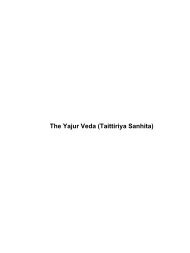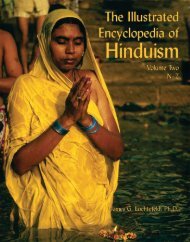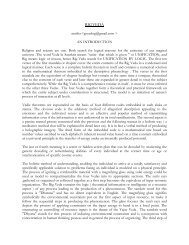The Illustrated Encyclopedia of Hindusim vol 2
Create successful ePaper yourself
Turn your PDF publications into a flip-book with our unique Google optimized e-Paper software.
Vasant Panchami<br />
India to earn their living by trading<br />
or other businesses. This four-fold<br />
varna plan does give the general status<br />
picture, but the specifics are much<br />
more detailed.<br />
Varnashrama Dharma<br />
In the dharma literature, varnashrama<br />
dharma is the ordering <strong>of</strong> dharma or<br />
religious duty based on the hierarchical<br />
social ordering <strong>of</strong> the four major social<br />
groups (varnas) and the four successive<br />
stages <strong>of</strong> life (ashramas). According to<br />
this theory, all people would be able to<br />
discern their social status and appropriate<br />
function based on their social class<br />
and stage <strong>of</strong> life. <strong>The</strong> interrelationship<br />
between these two sets <strong>of</strong> categories is<br />
<strong>of</strong>ten used to denote traditional Hindu<br />
society, in theory if not always in fact.<br />
<strong>The</strong> term survives in modern times,<br />
but because the doctrine <strong>of</strong> the<br />
ashramas is now largely ignored, those<br />
who uphold varnashrama dharma are<br />
primarily defending the hierarchical<br />
social divisions commonly known as the<br />
caste system.<br />
Varuna<br />
In the Vedas, the oldest and most<br />
authoritative religious texts, Varuna is<br />
a deity associated with the sky, with<br />
waters, with justice, and with truth.<br />
Varuna belongs to the earliest layer <strong>of</strong><br />
the Indo-Aryan deities; this is clearly<br />
shown by comparisons with the<br />
Avesta, an ancient Iranian sacred text<br />
that shows many parallels with the<br />
Vedas, and with even older epigraphic<br />
sources. As portrayed in the Vedas, however,<br />
Varuna’s influence has clearly<br />
declined—there are far fewer hymns<br />
addressed to him than to deities such as<br />
Indra, Agni, and Soma, and he seems to<br />
have played a far less important role<br />
than these other deities in Vedic religion.<br />
In the Vedas, Varuna is portrayed as<br />
the guardian <strong>of</strong> rta, the cosmic order<br />
through which the world proceeds. As<br />
the deity associated with the high heaven,<br />
he also watches over the deeds <strong>of</strong><br />
human beings and punishes them for<br />
any transgressions. <strong>The</strong> best known<br />
hymn to Varuna, Rg Veda 7.86, shows<br />
Varuna’s connection with justice, moral<br />
order, and the waters. <strong>The</strong> hymn is the<br />
lament <strong>of</strong> a person who has committed<br />
some <strong>of</strong>fense against Varuna and whose<br />
sin has become visible through being<br />
afflicted with dropsy, in which the body<br />
retains its fluids and swells. <strong>The</strong> speaker<br />
begs Varuna to reveal the forbidden act,<br />
“committed under the influence <strong>of</strong><br />
liquor, anger, or heedlessness,” so that<br />
Varuna may be propitiated and the sufferer<br />
healed.<br />
Despite his virtual eclipse early in the<br />
tradition, in the later tradition, Varuna<br />
retains his association as the god presiding<br />
over the waters. He is also considered<br />
to be one <strong>of</strong> the eight Guardians <strong>of</strong><br />
the Directions, each <strong>of</strong> which is associated<br />
with one <strong>of</strong> eight points on the<br />
compass. Varuna presides over the western<br />
direction.<br />
Vasant Panchami<br />
Festival falling on the fifth day<br />
(panchami) <strong>of</strong> the bright (waxing) half<br />
<strong>of</strong> the lunar month <strong>of</strong> Magh<br />
(January–February), celebrated as the<br />
first day <strong>of</strong> spring (vasant). This day is<br />
considered sacred to the goddess<br />
Saraswati, patron deity <strong>of</strong> the arts,<br />
music, and learning. In her honor, celebrants<br />
sing songs in melodic modes<br />
(ragas) associated with spring. Given<br />
Saraswati’s connection with learning,<br />
this is also traditionally reckoned as the<br />
day on which young children should<br />
begin their studies.<br />
Vasant Panchami is also associated<br />
with Kama, the god <strong>of</strong> love, since the<br />
coming <strong>of</strong> spring brings the reappearance<br />
<strong>of</strong> flowering plants, with their<br />
scents and colors. This is supposedly<br />
the day that Kama attempts to instill<br />
erotic desire in the god Shiva’s heart,<br />
first by bringing spring to Mount<br />
Kailas, where Shiva is meditating, and<br />
then shooting Shiva with one <strong>of</strong> his<br />
flower arrows. Shiva awakens from his<br />
meditation, becomes angry at Kama,<br />
741

















